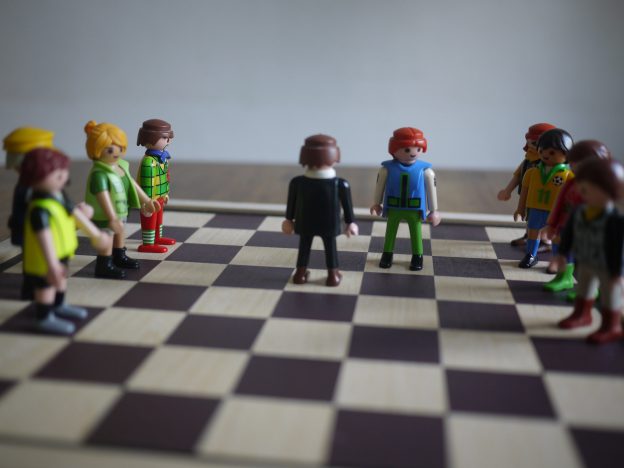
Different spaces, different settings
Climbing, hiking, pottery, cooking, archery … different settings bring different experiences to light. In the right context, they can provide a good basis for reflection. Today our five experts talk about their experiences with experience-based work.
Our group soup
„Today I want to hear about the most extraordinary methods you have ever tried with a group.“ Beate straightens her camera. The group is meeting online again today. Since everyone has a lot of experience with online meetings by now, it all works quite smoothly. Paul is the first to speak. He tells us about an assignment where he was supposed to accompany a department that had fallen out and was newly thrown together for team building. In the preliminary meeting it became clear that the group is very good at „pretending that everything is fine“, the conflicts were rather bubbling under the surface. „I had the impression that I couldn’t get at them with conventional methods,“ Paul laughs and says that the team had grumbled about what this had to do with their work, but then went ahead with it.
In the course of the morning, communication patterns became visible and lines of conflict broke open. Everyday situations such as „Who gets which stove plate? Will the pumpkin soup be pureed or not?“ were used for joint reflection in the afternoon. In addition, everyone had the feeling that they had achieved something together and were now connected to each other through a real sense of achievement. „And cooking metaphors like that are ideal for describing group processes,“ concludes Paul into the camera with a grin.
Climbing garden and scavenger hunt
Beate follows immediately and tells of two different seminars she held on the topic of „leading groups“. In one she took the group to a climbing garden, in the other she organised a scavenger hunt. In both settings, several people could try out leading the group through the parkour or aiming for the next stations. „Wasn’t that terribly time-consuming?“ interjects Yasemine. „Yes,“ says Beate, „I underestimated the preparation time for the scavenger hunt. You can’t be present at every single station. That means everything has to be reasonably self-explanatory.“ It was easier with the climbing garden, where everyone was in one place the whole time. „The question is whether climbing is possible for everyone. People with a fear of heights or impairments don’t do so well. Besides, it’s good to have a professional with you. I did it with a colleague who is trained as an outdoor trainer. I wouldn’t have dared to do it on my own.“
Making a vase
„I also did my seminar with professional support back then,“ Yasemine hooks in straight away. „I booked a pottery course. The assignment for the individual participants was to make a vase using a potter’s wheel. We had clay everywhere! In our hair, on our clothes, but not on the vase…“. At the urgent request of the others, Yasemine holds the vase she potted at the time into the picture. Rudi asks, „What was the topic of the seminar?“. Yasemine puts the vase away again. „Dealing with stress, frustration and failure. That’s why I chose something that is easy to do, but needs a lot of practice until it works well. The team’s issue at the time was that they were implementing a lot of projects but were never completely satisfied with the results.
During the reflection phase we then worked a lot with expressed as well as unspoken goals and wishes and expectations. This worked well and the participants, through the experience of the pottery course, had tangible experiences that were easy to name but did not come from the work context. Naming insecurities in the work context is often a big risk for team members, especially towards the manager and colleagues. Talking about an imperfectly potted vase as a „failure“ is far less risky.„
Martial arts and dealing with conflict
Maria says that during a seminar on conflict management she spent a session on martial arts techniques. Paul laughs, „What, you mean you’ll learn how to punch the other person right then?“. Maria rolls her eyes, she has been boxing for years and every time she tells us that she does training for conflict management, this sentence comes. She sighs, „No. Of course not. Martial arts is much more than punching people stupidly in the nose.“ You need good technique, composure, concentration and stamina, stress resistance and quick analysis of situations to be able to react quickly and correctly, she explains further. „If you run like a steamroller with anger towards your training partner, it’s a piece of cake for an experienced martial artist to give you a counterattack.
The same applies to negotiations, discussions or conflicts: unreflective, emotionally charged rumbling has rarely brought about productive solutions. Once you’ve experienced this on a physical level in martial arts, it’s much easier to translate it into everyday work.“ Paul nods a little ashamedly, „Ok, if you explain it that way, then I see some connections there. I’m sorry I just threw my prejudices at you before.“ Maria laughs, „No problem. If it gets too much for me, I can always punch you in the nose.“ Paul briefly looks as if he is very happy that the meeting is taking place online today, but then joins in Maria’s laughter.
Talking by Walking
„Rudi, you haven’t told us anything yet,“ Beate says, looking at him curiously. Rudi smiles a little sheepishly. „I don’t do such extraordinary things. The only thing I can think of is one-to-one coaching with a manager. We came to the conclusion in conversation that we both like hiking. She found it difficult to concentrate on the here and now during the sessions and her mind was often elsewhere.
So I suggested that she do a double lesson in walking. This worked out wonderfully! Walking is an activity that has allowed her to focus her thoughts on our conversation.“ Rudi shrugs and says that he now does this with this client on a regular basis. The others look at Rudi a little uncomprehendingly and almost in unison remark that they find this extraordinary enough.
Archery
Now that so much has been said about joint activities, our five experts decide to try something unusual themselves. After a bit of back and forth, they agree on archery. It’s not too sporty, it’s out in the fresh air and they all have the same amount of experience. „But we have to reflect afterwards,“ says Yasemine. Everyone nods in agreement. „Sure,“ says Paul, „once I’ve tried it out with you, then maybe next time I won’t make group soup, but have another arrow in my quiver.“ Rudi laughs, „Yes, and right away lots of nice metaphors to describe a process…“
One by one, the five say goodbye, but not before agreeing on a topic for next time. They want to discuss the challenges for trainers when they join an ongoing group process.
Authors: Gerda Kolb and Irene Zavarsky
Lust auf mehr? Zu allen Beiträgen der Serie kommst du HIER!

Dieses Werk ist lizenziert unter einer Creative Commons Namensnennung-NichtKommerziell-Weitergabe unter gleichen Bedingungen unter gleichen Bedingungen 3.0 Österreich Lizenz.
Volltext der Lizenz


